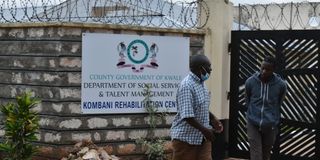Kwale tops in Coast with drug rehabilitation programme

Kwale residents leave the Kombani Rehabilitation Centre on June 25, 2021.
As the war on drug abuse continues, the government has resorted to medication assisted therapy (MAT). This is where drug addicts are given methadone as a substitute for heroin to pull them out of the addiction.
Methadone provides a feeling similar to that of heroin but keeps the addict from having withdrawal symptoms and cravings.
This has worked for some of the abusers who have recovered, but it is still a challenge in various parts of the Coast region.
It has been revealed that a majority of addicts now cross over from Mombasa to Kwale to get the medication.
Kwale County has two major rehabilitation centres - the Teens Watch Centre, a community-based organisation that deals with young and older people, including female sex workers, and the Kombani Rehabilitation Centre on the Likoni-Lungalunga highway.

A woman taking her methadone syrup.
Kwale is the only Coast county that owns and runs a drug rehabilitation centre in partnership with the anti-drug abuse agency Nacada.
According to Ahmed Said, a beneficiary and an official at the Teen Watch Centre in Ukunda, the reason more people come to Kwale for methadone is the fear of stigma.
“One of the major challenges that any recovering addict has is the stigma. Though they are trying to avoid the drugs, the community still sees them as addicts. It is not easy for the community to accept them back without judgment because they are known to be thieves or criminals,” he explained.
He added that because of this, it may be difficult for a family to completely accept that a person is recovering or is fully recovered and blame them for any theft or mistake, and this triggers a relapse.
“When it comes to treatment, the patients have a right to choose where they are conformable despite how available the resource could be in their environment,” he said, explaining why there are active methadone clinics in Mombasa but addicts still cross over.
Relapsing
Additionally, he said it is important to have an aftercare programme that will enable the addicts to avoid relapsing.
Abdalla Abdulrahman, a community policing officer in Mombasa who closely deals with drug addicts, said the biggest challenge in rehabilitation is aftercare, which has seen most addicts relapse after receiving methadone after over a year.
“This is what the county government and the national government do not consider. Once a person completes their methadone treatment, they should be supported with a job or a business to run that will keep them busy,” he said.
At Kombani, the gym area in the rehabilitation centre keeps clients physically engaged as they go through their rehabilitation journey.
It also offers table tennis, chess and pool table as part of indoor games incorporated in the programme to build their mental ability. Unlike centres in Mombasa and Kilifi, the Kwale County government-funded centre offers residential treatment that restricts movement that could jeopardise the recovery process.





